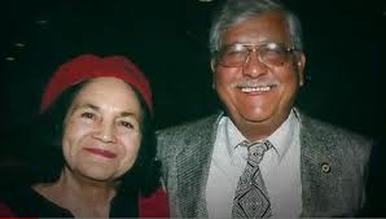“Every moment is an organizing opportunity, every person a potential activist, every minute a chance to change the world.”
—Dolores Huerta
Dolores Huerta has worked to improve social and economic conditions for farm workers and to fight discrimination. To further her cause, she created the Agricultural Workers Association (AWA) in 1960 and co-founded what would become the United Farm Workers (UFW). Huerta stepped down from the UFW in 1999, but she continues her efforts to improve the lives of workers, immigrants and women.
Early Life
Activist and labor leader Dolores Fernández, better known as Dolores Huerta, was born April 10, 1930, in Dawson, New Mexico, the second child of Juan and Alicia (Chavez) Fernandez. The young family struggled, and by the time Dolores was three, her parents divorced and her mother moved Dolores and her two brothers to Stockton, California. Dolores maintained a relationship with her father, who later became a union activist and a New Mexico state assemblyman. Juan’s own political and labor activism later proved inspirational to Dolores.
 |
| Migrant Workers in Stockton, CA |
Despite her achievements, Dolores experienced the racism many Mexicans and Mexican Americans suffered from, especially those who were farm workers. At school she was sometimes treated with suspicion and scorn. She was once accused by a teacher of stealing another student’s work because the teacher was convinced that Dolores was incapable, due to her ethnic origin. However, with time, her family’s economic conditions improved. During World War II, Alicia ran a restaurant and then purchased a hotel in Stockton with her second husband, James Richards. The businesses served the farm workers and day laborers, offering affordable rates and welcoming the diversity of the area.
 |
| Dolores with her husband, Ventura |
A Life of Activism
 |
| Cesar Chavez |
In 1965, the AWA and the NFWA combined to become the United Farm Workers Organizing Committee (later, simply the United Farm Workers). That year, the union took on the Coachella Valley grape growers, with Chavez organizing a strike of all farm workers and Huerta negotiating contracts. After five hard years, the United Farm Workers (now affiliated with the American Federation of Labor and Congress of Industrial Organizations) signed an historic agreement with 26 grape growers that improved working conditions for farm workers, including reducing the use of harmful pesticides and initiating unemployment and healthcare benefits. In the 1970s, Huerta coordinated a national lettuce boycott and helped create the political climate for the passage of the 1975 Agricultural Labor Relations Act, the first law to recognize the rights of farm workers to bargain collectively.
During the 1980s, Dolores Huerta served as vice president of the UFW and co-founded the UFW’s radio station. She continued to speak for a variety of causes, advocating for a comprehensive immigration policy and better health conditions for farm workers. In 1988, she nearly lost her life when she was beaten by San Francisco police at a rally protesting the policies of then-presidential candidate George H. W. Bush. She suffered six broken ribs and a ruptured spleen.
Dolores Huerta has been honored for her work as a fierce advocate for farm workers, immigration and women. She received the Ellis Island Medal of Freedom Award and was inducted in the National Women’s Hall of Fame in 1993. That year proved bitter-sweet for her as she also experienced the passing of her beloved friend Cesar Chavez. In 1998, she received the Eleanor Roosevelt Award, a year before she stepped down from her position at the United Farm Workers. In 2002, she received the Puffin/Nation Prize for Creative Citizenship. The $100,000 award provided her the means to create the Dolores Huerta Foundation, whose purpose is to bring organizing and training skills to low-income communities. Huerta continues to lecture and speak out on a variety of social issues involving immigration, income inequality and the rights of women and Latinos.
In 2006, Dolores Huerta visits Tucson High School and makes a speech. Within the speech, she states "Republicans Hate Latinos." In 2010, Arizona Attorney Tom Horne and other politicians used these words as their rationale for passing HB-2281-The Ethnic Studies Ban. In this interview, Dolores Huerta discusses the statement and its affect.
more about Latino History: rudyacuna.net



0 comments:
Post a Comment